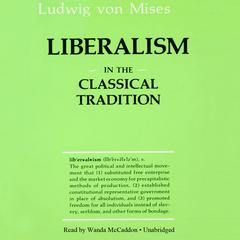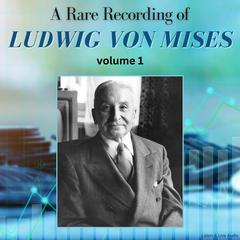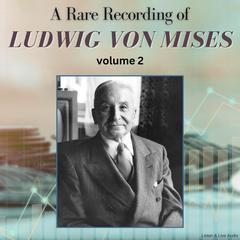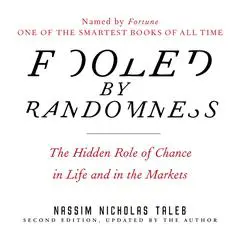 Play Audiobook Sample
Play Audiobook Sample
Human Action, Third Revised Edition: A Treatise on Economics Audiobook
 Play Audiobook Sample
Play Audiobook Sample
Quick Stats About this Audiobook
Total Audiobook Chapters:
Longest Chapter Length:
Shortest Chapter Length:
Average Chapter Length:
Audiobooks by this Author:
Publisher Description
Ludwig von Mises is to economics what Albert Einstein is to physics, and Human Action is his greatest work. It is a systematic study that covers every major topic in the science of economics. It is also one of the most convincing indictments of socialism and statism ever penned. When it first appeared in English in 1949, it was a sensation, the largest and most scientific defense of human freedom ever published, igniting an eruption of critical acclaim. For instance, Rose Wilder Lane wrote, “I think Human Action is unquestionably the most powerful product of the human mind in our time, and I believe it will change human life for the better during the coming centuries as profoundly as Marxism has changed all of our lives for the worse in this century.” Henry Hazlitt wrote, “It should become the leading text of anyone who believes in freedom, in individualism and in a free market economy.” The acclaim has not ceased, and the book is universally recognized as a classic in the field of modern economics.
Download and start listening now!
"Probably the most abstract book on economics/human action. On the downside sometimes the author tends to take rigor a bit too far (for fun) and I actually initially even skipped some initial chapters, however given what interesting and surprising results you can eventually reach I guess it makes sense for those sections to be there. You're likely to encounter subjects others have written whole books about condensed into a few phrases and some symbolic notations... on the upside however, some results are really fascinating and of huge human&social consequences and some truly eyeopening stuff in there."
— Void (4 out of 5 stars)
Quotes
-
“[Human Action] should become the leading text of everyone who believes in freedom, in individualism, and in the ability of a free-market economy not only to outdistance any government-planned system in the production of goods and services for the masses, but to promote and safeguard…those intellectual, cultural, and moral values upon which all civilization ultimately rests.”
— Newsweek -
“Every now and then a book comes along that both sums up and extends the collected wisdom of some science. Human Action, by Ludwig von Mises, was such a book. Fifty years after it first came out, it is still one of the classics of economics...[and] still speak[s] to the vital debates of the day.”
— Investor's Business Daily -
“This is Ludwig von Mises’ magnum opus, the magisterial contribution in which he develops his flagrantly controversial philosophy of the social sciences, his brilliant entrepreneurial theory of the market process, and his devastatingly consistent classical liberal perspective on political economy, into an overarching system of extraordinarily impressive scope. Human Action is a work that has, for almost half a century, retained its freshness and its relevance…Recent developments in the economics profession suggest that the most far-reaching impact upon economic thought exerted by this celebrated work may be that still to come.”
— Israel M. Kirzner, New York University, author of Competition and Entrepreneurship -
“Human Action says it all. In this towering masterwork, Mises makes the case for limited government and a free society, pointing out the inseparability between freedom and free enterprise—that you can’t have one without the other.”
— William H. Peterson, adjunct scholar, Heritage Foundation
Human Action, Third Revised Edition Listener Reviews
-
" This is and Man, Economy, and State by Murray N. Rothbard are works of genius! "
— Willie, 2/2/2014 -
" I think it contains a wealth of economic knowledge, but is such laborious reading that I will depend upon the Cliff Notes for my economic enlightenment. "
— JB, 1/31/2014 -
" The original virtue of the Austrian School of economics, aside from Menger's ability to coherently connect cause and effect for Austrian policymakers who never listened to him, is that it was an early adopter of the idea that economics as a school of thought must be based on what are now called "micro principles" like individual human behavior. An economy, ultimately, is the sum of individual market choices, each one made because the actor thought they would gain from it. Mises attempted to (and certainly did not even come close to succeeding at) provide the foundation for a science of individual behavior that did not rest necessarily on psychology. He did this for the right reasons, but his effort was totally in vain. "
— Richard, 1/29/2014 -
" Excellent book. It can be an abstruse read at times, but it is a rewarding experience. "
— Trenton, 1/20/2014 -
" If you have patience for economics. "
— Deane, 1/18/2014 -
" This is a classic and a must read for anyone who wants to understand TRUE free market economics and how it can create an eye opening realization of the fraud of both the welfare and warfare state. "
— Michael, 1/18/2014 -
" von Mises is way to heavy for the average economist, much less the average layman; but a must read for anyone who wants to really understand Austrian economics. "
— Nedland, 1/4/2014 -
" A complicated book, but it is a must if you want to understand economics. "
— Phillip, 1/2/2014 -
" Not light reading but valuable teaching. "
— Rich, 1/1/2014 -
" More beyond economics. "
— Bill, 12/9/2013 -
" Amazing, dense, the future of understanding the world. "
— Emily, 5/25/2013 -
" I skipped the first few chapters - his ramblings on philosophy of human condition, action and free will are pretty forgettable. But the the later parts on pure economics (Part IV, starting with chapter 12) are superb. "
— Alex, 4/22/2013 -
" Insightful...and incredibly difficult to read. "Human Action" is von Mises Magnum Opus and the definitive source book for Austrian Economics. However, if you are coming to the subject fresh, then "Human Action" is not the best place to start. "
— Ray, 4/20/2013 -
" The best work on economics ever written. If Mises had been an anarchist he'd have been perfect. "
— Monica, 11/18/2012 -
" Heavy economics -- but the conservative kind. I didn't really like Hayek, but this book impressed me. "
— Alan, 9/30/2012 -
" Ludwig von Mises's magnum opus of economic analysis through praxeology, and one of the greatest defenses for the free market ever composed. "
— Macfall, 9/5/2012 -
" Notable only now for ideological and historical reasons. "
— Don, 8/8/2012 -
" A remarkable work. It's very dense; I would read only a few pages (and occasionally a few paragraphs) before I felt compelled to pause for consideration, exploration, and integration of the concept. "
— Izaac, 5/1/2012 -
" A must read for anyone who wants to understand the basics about Economics and Human action. Mises is truly a genius ! "
— Å erifović, 2/1/2012 -
" Mindblowing treatise on the structure of societies. "
— Daniel, 7/8/2011 -
" I'd been introduced to his ideas through others but this was the first book of his that I've read in entirety. Incredible. Very clear common sense approach to economics. A must read for anyone interested in economics or life in general. "
— Josh, 3/11/2011 -
" von Mises is way to heavy for the average economist, much less the average layman; but a must read for anyone who wants to really understand Austrian economics. "
— Nedland, 12/11/2010 -
" Mindblowing treatise on the structure of societies. "
— Daniel, 5/16/2010 -
" A must read if you want to learn about Austrian economics! "
— Pollo, 12/30/2009 -
" The best work on economics ever written. If Mises had been an anarchist he'd have been perfect. "
— Monica, 9/20/2009 -
" Mises makes a very strong case for free market. He starts with a simple premise such that Humans act to remove uneasiness and takes that to its logical conclusion. "
— Kevin, 7/8/2009
About Ludwig von Mises
Ludwig von Mises (1881–1973) earned his doctorate in law and economics from the University of Vienna in 1906. In 1926, Mises founded the Austrian Institute for Business Cycle Research. From 1909 to 1934, he was an economist for the Vienna Chamber of Commerce. Before the Anschluss, in 1934 Mises left for Geneva, where he was a professor at the Graduate Institute of International Studies until 1940, when he emigrated to New York City. From 1948 to 1969, he was a visiting professor at New York University.
About Bernard Mayes
Bernard Mayes is a teacher, administrator, corporate executive, broadcaster, actor, dramatist, and former international commentator on US culture. He is best known for his readings of historical classics.

















